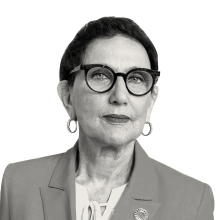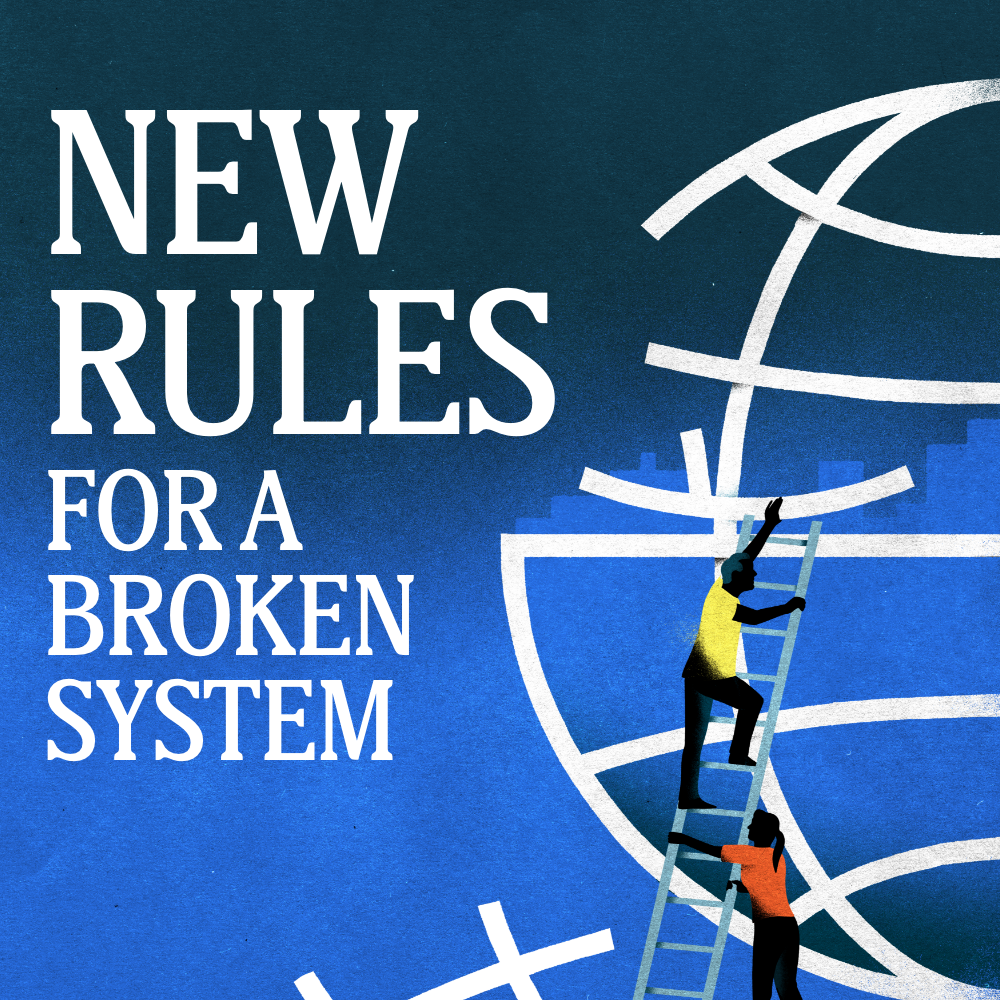
Sébastien Thibault for FP Analytics
Rebeca Grynspan puts the current debt crisis—which she says should more accurately be referred to as a “development crisis”—in simple terms: Clarity is necessary to bring about confidence, and confidence is necessary to bring about capital. In an interview with FP Analytics, Grynspan—Secretary-General of United Nations Trade and Development (UNCTAD)—talked about her organization’s priorities ahead of its October 2025 ministerial conference in Geneva, why “beyond GDP” measures should be used in debt assessments and investment decisions, and how reliable rules are key to speeding up financing. The following transcript has been edited for length and clarity.
FP Analytics (FPA): In your role as Secretary-General, you have highlighted the key challenges facing developing economies today, including the growth of the digital economy, the rise of services trade over goods, and the need to establish new industrial policy for development. How is UNCTAD working to address those challenges, and what do you see as viable solutions?
Rebeca Grynspan (RG): Let me put it simply: today, it seems that uncertainty is the highest tariff. The map of trade is changing fast. Tariffs that were near 3 percent a few years ago have now reached almost 20 percent and in several major markets are as high as 28 percent. An even bigger obstacle is predictability, or lack thereof. When rules change often, investment slows. Countries need reliable trade policy, and that means clear signals, stable time frames, and transparency. Especially the smallest and most exposed exporters need time to adjust so development does not become a casualty of trade tensions.
As services trade expands, UNCTAD supports growth in both goods and services, with digital tools complementing established analog strengths. We help countries harness the digital economy for development by building open, fair, and secure digital markets where technology serve people and developing countries can create, not just consume, innovation. We provide data and forward-looking analysis to decision-makers. We help design competition, consumer and investment rules that keep markets open and fair. And we work with partners to reduce trade costs and improve logistics so small firms can sell across borders. Again, this is practical. We focus on clear rules that encourage innovation, skills linked to real jobs, and standards that connect economies instead of fragmenting them.
In a new industrial-policy world, trade rules should level the playing field—not reward the biggest subsidy budgets—given many developing countries are weighed down by debt. We need digital networks that link people and businesses to markets, reliable ports and corridors that cut time and cost, and skills systems that raise productivity across communities. These are foundations for jobs and exports, not showcase projects.
One key aspect relevant to all of this is to change how we measure success. If leaders are judged only by short-term output, they will optimize the wrong things. “Beyond GDP” means to measure what builds resilience and well-being, and those measures need to be used in budgets, debt assessments, and investment choices. When we measure what matters, resources move to what people value and need. In short: reliable rules, a modern industrial strategy that builds capacity, and metrics that finance inclusion and resilience. That is how we turn uncertainty into investment.
FPA: How does UNCTAD work with the governments of low- and middle-income countries (LMICs)—particularly within Africa, where there are substantial youth populations—and other partners to guide their priorities and activities and support their increased representation and voice on the global stage?
RG: I believe that development only works when countries are not guests in global decisions but when they are co-authors, setting their own priorities and shaping the results.
In my conversations with African leaders, three messages are constant. First, lower the cost of capital by correcting unfair risk perceptions. Second, create value at home, not only export raw potential. Third, open space for a young population to work and innovate. We shape our work around these goals—country by country—so our analysis, technical support, and convening power move rules, resources, and results in that direction across trade, investment, and debt.
Voice increases when countries are organized and present a unified position. At the U.N.’s Fourth International Conference on Financing for Development in Seville, governments proposed a borrower-led platform to exchange experiences, coordinate approaches, and promote fairer debt treatment. Faster and fairer treatments are needed to protect development budgets and bring back growth. UNCTAD supports countries to prepare common positions, share comparable data, and build negotiation capacity. And beyond debt, we help bring African and other LMIC perspectives into standard-setting on data, competition, and investment.
This also connects to the digital economy. As trade in services expands, opportunity will follow connectivity, competition, and skills. We bring governments, regulators, platforms, and investors to the same table so small firms, women, and young entrepreneurs can compete and not just connect. This means solving practical chokepoints like affordable data, cross-border payments that work for small firms, and last-mile logistics that shorten delivery times and lower costs. Multipolarity is real but should widen participation to secure more seats, more voices, and more responsibility in the rules that shape the future.
FPA: Our Global Governance Reimagined project focuses on reforming debt, development aid, and international financial institutions. In your view, what are the most critical areas for reform of the international financial architecture to promote equitable and sustainable development, and how can UNCTAD support reform efforts?
RG: First, I underscore that this is not a debt crisis but a development crisis.
The numbers are very clear. Developing countries paid $921 billion in interest last year; 3.4 billion people live in countries that spend more on interest than on health or education; and 61 economies spent at least 10 percent of government revenue on interest in 2024. These costs have a human face: teachers not hired, clinics delayed, and climate defenses not built. When a minister must choose between paying creditors or serving citizens, the system is not doing its job.
So, the direction of reform is very clear to me. First, countries need predictable and timely debt workouts, including for middle-income economies, so restructurings are faster and fairer and protect development spending. A new borrower-led coordination space, requested by countries in Seville, can help provide that predictability. Second, they need more and better multilateral finance—development banks with greater lending capacity, fairer terms, and tools that allow investment through shocks, including pause clauses after disasters and more local-currency options. Third, they need better metrics—embedding “beyond GDP” into debt and investment decisions so resilience, inclusion, and nature are part of what gets financed, not only short-term output.
UNCTAD supports this agenda with evidence and policy diagnostics, through technical cooperation that strengthens debtor coordination and transparency so policymakers can plan with facts, and by building coalitions that work across institutions. We will advance this through UNCTAD16. Our ministerial conference in Geneva from 20–23 October 2025 will set our mandate for the next four years, moving from momentum to concrete change.
FPA: Given rollbacks in official development assistance, high levels of debt, and concerns over trade disruption or breakdown, how can governments and the international community continue to sustainably finance their development goals? What is the role of private finance in that process?
RG: This is again linked to the critical importance of uncertainty—because capital follows confidence, and confidence follows clarity.
Governments and the international community can keep financing development by protecting fiscal space and directing scarce concessional funds to investments with the highest social returns: clean power, reliable logistics, digital connectivity, and skills. This requires steadier trade policy, faster action where debt is unsustainable, stronger development banks that can lend more and better during shocks, and action against illicit flows so domestic resources stay at home.
Private finance is essential when incentives and safeguards are right. Investors price risk better when facts replace myths. That is why transparency and timely, comparable data are so important. The pipeline is key as well: Projects with strong social returns but weaker private pull need good preparation and community engagement, so they earn trust as well as financing.
Public leadership sets the field with standards, accountability, and protection of social spending during crises. Blended finance can help, but clarity of rules and credibility of plans do most of the work.
This is about signals and execution. Markets, technology, and savings exist at scale. But today, clarity is limited. Only if leaders send consistent signals will capital move into the real economy. That’s why UNCTAD16 is a moment to turn alignment into commitments: rules that are reliable, projects that are investable, and progress people can feel.
Rebeca Grynspan of Costa Rica has been Secretary-General of UN Trade and Development (UNCTAD) since September 2021. Prior to her current role, she was Secretary-General of the Ibero-American Conference (2014–2021), Associate Administrator of the United Nations Development Programme (UNDP) (2010–2014), UNDP Regional Director for Latin America and the Caribbean (2006–2010), and Director of the Subregional headquarters in Mexico for the Economic Commission for Latin America and the Caribbean (2001–2006). Prior to joining the United Nations, she held several ministerial level positions with her government, including as Minister of Housing, Minister Coordinator of Economic and Social Affairs, and Deputy Minister of Finance, before becoming Vice President of the Republic of Costa Rica from 1994 to 1998.
More on Debt Architecture
Fixing Foreign Aid
Episode 1: How have the recent cuts in foreign aid impacted countries in the global south? And how did so many countries become reliant on foreign aid to begin with?
Tackling Sovereign Debt
Episode 2: How can we ensure countries looking to finance their future don’t have to mortgage away their present?
Reforming Global Finance
Episode 3: What can the World Bank and International Monetary Fund do to ensure more countries from the global south have a seat at the table?




